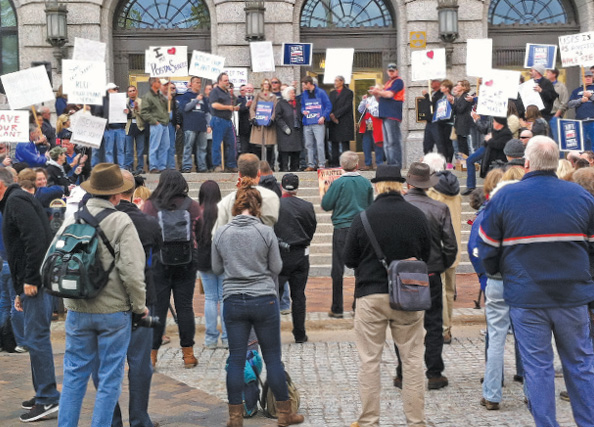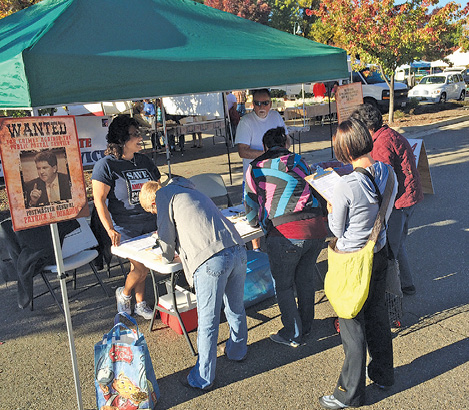Organize to Fight Consolidations!
January 1, 2017
(This article first appeared in the January-February 2017 issue of The American Postal Worker magazine.)
It is time to assess our goals for the next three years. we still have to work hard to stop the consolidations and restore the service standards. It is time to up the fight against the reason for delayed mail. It is hurting the Postal Service’s brand and lowering the public’s trust in us.

We must get legislation to change the service standards back to where they were on July 1, 2012. Mail delay is rampant throughout the country, especially in areas where there were either partial or total consolidations. The new members of Congress need to know if consolidations have occurred in the areas they represent. We must stress the need for their support to restore the service standards.
Recent Office of Inspector General (OIG) reports illustrate a serious problem. The Postal Regulatory Commission (PRC) continues to address in its annual report that the USPS fails to meet even the degraded service standards.
Consolidations
Twelve sites were consolidated totally last year: Asheville, NC; Athens, GA; Elko, NV; Florence, SC; Houston, TX; Kalamazoo, MI; Kokomo, IN; La Crosse, WI; Lafayette, IN; Northwest Boston, MA; Pendleton, OR, and Salina, KS.
There are 52 sites that have gone through partial consolidations since 2012, and 17 sites are in a hold pattern, “To Be Determined.”
In the July 8, 2016 interest arbitration award for our National Collective Bargaining Agreement (CBA), the arbitrator established a moratorium on consolidations till April 2017. The arbitrator stated the parties must engage in meaningful discussions on future consolidations, serving the interest of both parties. He stated the moratorium, should not, however, be viewed as a start date. If plant closings or consolidations should occur, the Postal Service is to perform new feasibility studies prior to implementation.
We must start building our coalitions as well as our relationships with the public and media to have them in “ready mode” when a public meeting is held. Remember these coalitions are not just an asset for the consolidation fight, but for all the future battles we face with the Postal Service.
Service Standards
If the service standards are changed back to July 1, 2012, the partially consolidated sites should regain the Delivery Bar Code Sorter (DBCS) and Advanced Facer-Canceller System (AFCS) equipment they lost.
The delayed mail surge has a big enough effect on the public. It is a problem that must be taken seriously by the USPS. We must push to ramp up the 64 consolidated sites and bring back the equipment and employees.

Redding, CA, farmers’ market to keep the local mail processing plant open.
External First-Class Mail (EXFC) measurement scores declined more than 51% in 2015 compared to 2014. EXFC scores for two-day and three-five day first class mail delivery are declining, failing to meet even the degraded service standards. An OIG investigation found mail consistently arrives late to mail processing plants.
Mail would not be late if the consolidations had not occurred. The 81 sites are strategically placed to ensure overnight service could be managed easily.
The OIG offered a remedy with air transportation. However, due to high costs, USPS cut their use of it and focused on more ground transportation. Air transportation is not the answer. Restoring service standards and mail service back to those 64 sites where a partial or total consolidation occurred, is the answer.
Prior to consolidations, postal employees very rarely worked overtime. Now members work overtime nearly every week. Productivity is lost when you over-work employees, causing more stress, turnover and injuries. It is not right for workers to be unnecessarily put in danger.
The USPS has more mail sorting at fewer facilities. The facilities are short staffed and there are higher transportation costs. Why can’t the Postal Service just agree that the last group of 81 planned consolidations were a miscalculation that adversely affected services? The Phase 2 consolidation plan was too deep of a cut. It degraded service standards and delayed mail service nation-wide.
The argument has been made time and again, don’t slow down mail delivery when trying to build service to the public. Once service standards are brought back, we will have fewer complaints at our call centers and negative stories in the media. Congressional members will also get fewer calls regarding mail service delays.
Organize!
We have an urgent need to organize our members and build coalitions. We must protect one of the cheapest and most secure communication vehicles in the world. The APWU’s survival depends on how we can mobilize to change the tide of consolidations.
Let’s build activists from the floor to help us save the plants. The April 2017 moratorium will come upon us soon. We must strengthen our ranks.
Look for upcoming activities to help locals build their connections with members, community organizations and the local media. We also want to help you to build your relationships with congressional and legislative members in your area.
If you need to find and train more union activists for your local, go to the Vice President’s page on apwu.org under “Departments & Divisions.” There are “Resources” available for you in the column on the right. You can download the information and/or request copies be sent to you. Do not hesitate to utilize them.
The union will be stronger when everyone is involved. Other unions work hard to build a member-to-member network and have found success. It does take time, but you have nothing to lose by trying new organizing techniques.
Thanks to all the members, stewards and officers willing to step up and help build our union.



